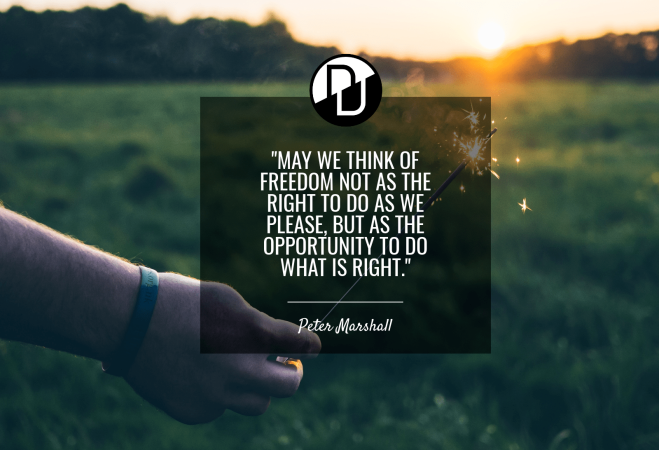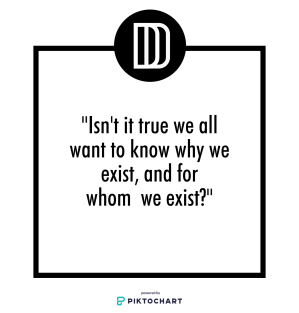Hard to believe it was just two months ago we were celebrating Star Wars and making bad Timberlake jokes.
Tag: blog
On The Other Side Of Pain, There Is Healing; Lessons From Behind
It doesn’t feel good, pinning your writhing two-year-old to the floor while he pleads for mercy in squeals of agony. And it doesn’t feel good, holding back tears, watching your wife cry as she applies more diaper rash cream to a reddened and raw toddler’s bottom. 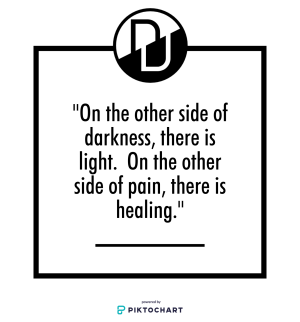
I’d never tortured anyone before–Slumdog Millionaire style–but now, at least, I know I never could. I lack the necessary callousness, not to mention I hate conflict. And screaming. The only reason I fought through it was, as a dad, I knew the butt-cream was a needed remedy and vital for the long haul. It had to get worse before it got better.
It was an important reminder that I somehow managed to reflect upon as I muttered the most miserable version of Old MacDonald in Isaiah’s ear. On the other side of pain, discomfort, and conflict is, very often, healing.
In the life that surpasses the issues of my child’s ass, the healing we want isn’t always the healing we get. Or, at least, we are often in need of a greater endurance to help us through hardship so we can survive to another season of hope.
Wallow
Those prone to depression and anxiety are often feelers. And, the thing about feelers is we tend to live in the moment but just not in the sky-diving way. It’s more like the prisoner way, and we lack the perspective to remember life beyond bars. So, when hardship is all we feel, hardship is all we know. We hear the Sir Winston Churchill quote, “When you’re going through hell, keep going,” only to climb back into bed, saying, “Nah…I’m good…I’ll stay where I’m at.”
When a death in the family occurs, or when a friend takes his life; when a job is lost, when life is just difficult, or when depression is rearing its head and you lull yourself to sleep with fantasies of not waking up, it’s often easier to wallow than to wait and work. But, if healing is what we want, we would do well to choke down the pill of hardship by embracing it so we can work through it.
Wait
An important part of waiting is accepting grief. Whether your pain is because of an external event or an internal wrestling, it is okay, and actually healthy to mourn over your hardship. It is when we remain in this stage that waiting becomes wallowing.
As you learn to wait for healing, learn also to grieve. Host a funeral for your pain, journal regularly, or write it all out and burn the paper. An outward, pseudo-ceremonial act, can often help us grieve appropriately so we can healthily move on.
It is vital that we cultivate hope as well, leaning on others to be reminded of the mentality that “this too shall pass.” There is life beyond bars. There is healing through hardship.
Work
When we’ve allowed ourselves to grieve and have begun to recognize hope, it is then time to work. This is the time in which we face our darkness head-on, arming ourselves with valuable resources.
Seeing a mental health professional is a fantastic place to start, but if that feels too daunting for a first step, open up to a friend or family member about this difficult season. Whatever you decide to do, remember you are mentally responsible. No matter what you tell yourself, you have the power and the ability to get yourself into a position where you can begin to thrive. There is no need to do it all yourself, but if you want to see a counselor, it’s your responsibility to get yourself through the door. The good news is a professional will take it from there, letting you know of a few more practical steps.
On the other side of darkness, there is light. On the other side of pain, there is healing.
My son’s butt is better today. We are waiting patiently for it to heal, letting him watch a little more TV than usual and giving him time to rest. But, we are also taking the necessary steps to get him healthy. Butt paste, naked time, and baby-wipes made of paper towel and water (This was a game-changer, by the way, if your kid is being tortured from behind). I’m sure we’ll have more traumatic parenting moments, maybe even later today, but at least we know that just because something doesn’t feel good, doesn’t mean that it isn’t, in fact, good.
Thinking Is Like Spelunking; Just Make Sure You Can Get Out
Ever been spelunking?
It’s not fun.
Before you pull out a Mains family photo album for proof of me in a hard hat and coveralls, you should know, I haven’t technically been. I’m not sure I could do it. I remember shaking out a panic attack when I got stuck behind the couch once as a kid. I did study philosophy for a semester in college and that, I believe, was spelunking of the mind.
The thing with overthinkers is that we are thoughtful, inquisitive, and perceiving–we are sponges soaking up the world around us. But we can easily get lost, asking question after question like one step after another into a dark cave until we find ourselves trapped in the darkness. Our problem is we don’t know how to stop thinking, or when to turn our minds around.
I learned this the hard way during my semester of philosophical studies. When I signed up as a naive twenty-two-year-old, I had no idea I was entering into an addictive world of questions where every morsel of thought could be challenged, analyzed, feasted upon, chewed up and spat out. I plummeted, lacking the ability–the discipline–to keep from slipping too far into a world of what-ifs and wonderings.
Those who tend to overthink like me value the art of thought and we can all agree that few in this world aspire to be under-thinkers. But if overthinking can get us into trouble and underthinking is simply unproductive, then there must be a discipline of thinking responsibly–just enough–not too much and not too little. This discipline comes from exploring the cave of thought with healthy questioning, open-mindedness, and perspective while knowing when to stop and how to give the mind over to faith.
The fact is, we can never understand the world perfectly. We can never read other people’s minds or tell the future no matter how much thought we put into it. So, there comes a time when we need to trust the world is as it should be; when we need to be at peace with not having all the answers; when we need to stop thinking.
Here’s my advice to you: stop. Stop!
Just kidding. I know it’s not that easy. Maybe for some super-humans, it is, but for most overthinkers, such a blunt command is as intimidating as a laser target to your chest. Instead of simply stopping, start by recognizing the caves you tend to wander in. What or who causes you to think unhealthily too much? Mark the stone walls acknowledging where you are in your mind and ask yourself what is motivating you to walk further into darkness. More often than not, it’s some sort of anxiety, insecurity, or unrelenting appetite for an impossible answer.
After an observing period, explore what practices or mental reminders can help you stop or slow your mind. Maybe a distraction, relevant quote, or activity can be the thing to turn you around so you can be at peace with what you don’t know and productive with what you do.
There are many wonderful attributes of a contemplative, thoughtful person. But just like anything, thinking is best used in moderation. Learn how to embrace your mind without wholly trusting on it. Learn how to let go. Learn how to think responsibly because exploring the caves of your mind is an extraordinary adventure as long as you can find your way out.
Please share thoughts, questions, concerns…anything! Tweet me @DaddingDepressd or comment below!
INFOGRAPHIC: What NOT To Say To Our Boys If We Want Healthy Men
We hear a lot about toxic masculinity these days. To be clear, there is a sure difference between masculinity and that which is toxic.
Masculinity (“possession of the qualities traditionally associated with men”) is a good thing as long as it embraces the freedom of self-expression and promotes positive qualities in men. It becomes toxic when the arrows passed down from society’s parents are dipped into the poison of impossible standards, unhealthy emotional practices, and misogynistic ideals. This negative influence happens every single day, and it’s mostly occurring right under our noses, oozing out of our ignorant mouths.
If we want to raise healthy men, we need to stop polluting our boys with these classic sayings.
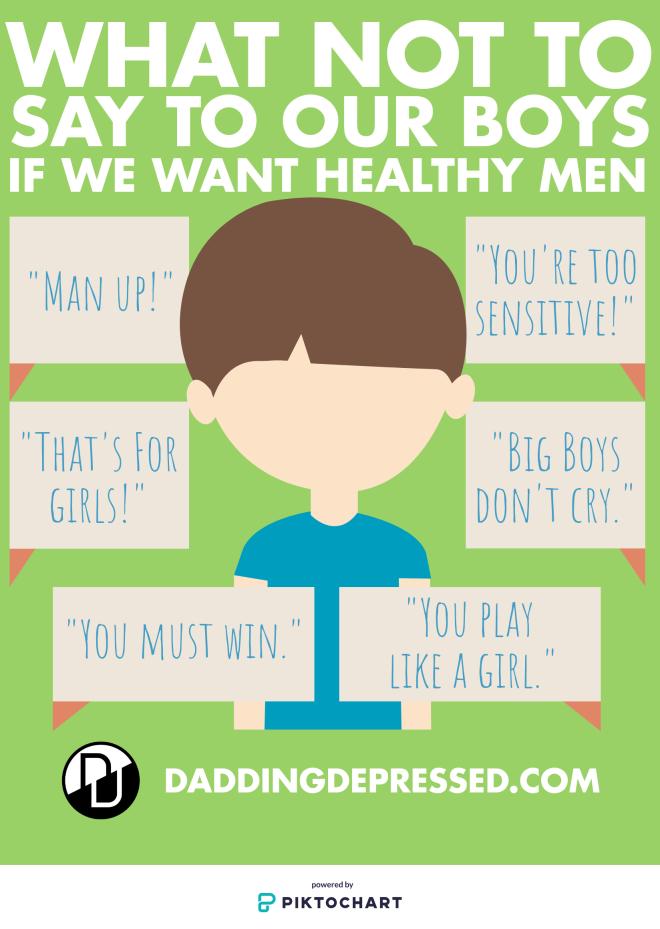
“Man up!”
This archaic saying implies, first of all, that the boy is not a man (an ambiguous concept anyway). And, secondly, to be a man, he must suppress his feelings and emotions–an unhealthy practice for the mentally resilient.
If you’re saying this (or anything like it) to your son, consider reading my post, Are You Man Enough?.
“You’re too sensitive!”
Sensitivity is an amazing attribute, especially in boys. It should be embraced, encouraged, and nurtured, not denied. I get it–it’s hard–“he cries a lot,” but explore ways in which you can encourage his sensitivity while teaching him of the grand responsibility that it is.
Fred Rogers said, “I feel that if we…can only make it clear that feelings are mentionable and manageable, we will have done a great service for mental health.”
“That’s for girls!”
Whether it’s art, music, dance, gymnastics or playing with dolls, there’s no need to separate children into the harsh categories of blue and pink. Kids are kids. A pivotal part of childhood is exploration–figuring this world out–and, if we place too many boundaries around the curiosity of boys, we’ll create tentative men who don’t know their place in this world.
“Big boys don’t cry.”
Yes, they do. Crying is an appropriate release of emotions, and we should be teaching our sons it’s okay to let it all out. If the kid is crying at inappropriate times, there are other ways to go about teaching emotional responsibility. Saying “big boys don’t cry” is a lazy parenting move. Try teaching him the value of voluntarily stepping away from a difficult situation to rest, reflect, and reset. Or say something along the lines of “Are you sad? It’s okay to be sad. Can you tell me why?”
“You must win.”
This, in sports or anything else for that matter, weighs down our boys with impossible standards and communicates a “win-at-all-costs” mentality. It teaches that power is everything and that there is no benefit in trying if you’re going to fail anyway. Praise the effort and pick them up when they fall.
Read my post, Do You Have A Fixed Or A Growth Mindset?.
“You play like a girl!”
Is that really all that bad? Saying things like this teaches boys to undervalue and disrespect women while enforcing their own insecurity. It’s simply a worthless statement.
Don’t revert to lazy quips and archaic sayings. There is bravery in tears, strength in weakness, and victoriousness in failure. We are teaching our boys how to be men, and that is a great responsibility.
What else should we stop telling our boys?
How To Thrive And Live Your Best Life
I’ve been thinking about it a lot lately. Why we do what we do. Why we struggle or why we thrive. What urges our pursuits, and navigates our ambition.
Everything (and I am beginning to believe everything) boils down to two driving (or lacking) factors in each of us: an individual’s sense of purpose and belonging. Isn’t it true we all want to know why we exist, and for whom we exist?
I often lose sight of one or the other. When I don’t have a confident sense of individual purpose, I easily fall into the trap of anxiety, people-pleasing, and a hopelessness in which I can believe nothing I do truly matters. Where there is no sense of belonging in my life, I become isolated, and even more desperate to realize my divine intent, but less motivated to pursue it.
When I recognize that every person is in pursuit of these two things at our cores (purpose and belonging), I can begin to empathize with others’ decisions and understand what it is that drives them and myself to do what they/I do.
Think of the neo-Nazi who has a sense of belonging but he has a misdirected and perverse sense of purpose. Or the occult leader who has influence and a strong sense of purpose, but is practically insane without true transparency in authentic, side-by-side community. These, of course, are extreme examples, but both go to show the importance of evaluating where you are at on the scale.
Do you have a sense of purpose without a sense of belonging or vice versa?
Or have you struck a healthy balance and learned how to thrive?
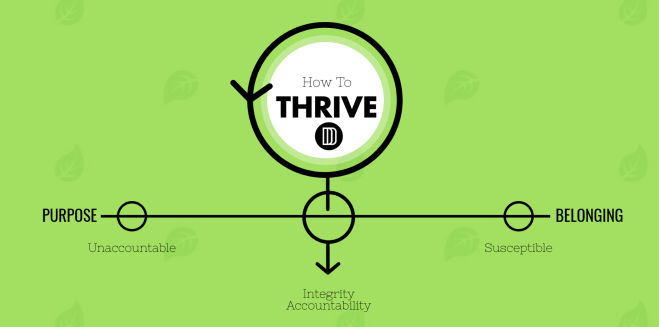
Ask yourself two questions.
Firstly, why do you exist? There are 7.6 billion people in the world and only one of you. This implies two things.
- No one (and I mean no one) else has your voice, your heart, your mind. You are unique–we need you–and as Dr. Seuss says, “Today you are You, that is truer than true. There is no one alive who is Youer than You.”
- You are free to explore your unique purpose–how you will use your voice, talent, heart, and mind to influence those around you. There is no pressure. There is no rush. All at once, the world is waiting for you but is not dependent on you. In that truth is freedom.
Secondly, for whom do you exist? People are meant to be in community. Humans are a pack animal. A sense of belonging comes from actively living alongside others who accept you for who you are, and who desire to see you change for the better.
Where are you at on the scale?
Purpose Without Belonging
This life, while passionate, is lonely, and lacks appropriate accountability. One might think you can have purpose without belonging but it is an empty, isolated, and eventually dangerous fate.
Purpose without belonging leads to an ambiguous and unaccountable purpose. If this is where you’re at, seek out others. Initiate a date with a friend or conjure up the bravery to attend a social event (like Man Pong!).
Belonging Without Purpose
Belonging without purpose leads to unhealthy people-pleasing, anxiety, and sacrificed morals. Think of the middle school kid who would do anything to fit in. Or in a toxic relationship, the less dominant person stays for a sense of belonging but has unhealthily shelved their individual sense of purpose. How often do we cheat our morals to please those around us? I feel like I do it all the time.
Belonging without purpose leads to a malleable purpose susceptible to peer pressure and abuse. If you’re in this spot on the scale, take time to evaluate your community. Ask yourself why you’re in the relationship and ensure that it encourages your reason for existing.
Purpose And Belonging
When we have a healthy sense of purpose and belonging, we are finally set up to thrive. You will know why you exist and have a sense of belonging when you’re in a community that encourages you and is encouraged by you. Some people strike this balance at work or church or with friends or family. However you find it, I encourage you to be in constant pursuit of that sweet spot between influencing and influenced.
Right now, where do you lack? Do you have an ambiguous or malleable sense of purpose? Do you have a strong and healthy sense of belonging in a community with friends, coworkers, or family?
Why do you exist, and for whom do you exist? You must confront this question, and to say, “For no reason and for no one,” simply is not an option.
Share your thoughts! Comment below, or visit my Contact page.
Infographic: How To React When A Friend Tells You They’re Depressed
Many people don’t know how to appropriately respond when a friend or family member opens up about depression, anxiety, or suicidal thoughts. And, too often, mental illness is a conversation-killer when it needs to be a conversation.
As a potential support to someone with a mental illness, how do you keep the dialogue healthy, helpful, and open when someone you love shares their darker side? Here are a few principles I’ve learned from having been on both sides of the conversation. Hopefully, they help.
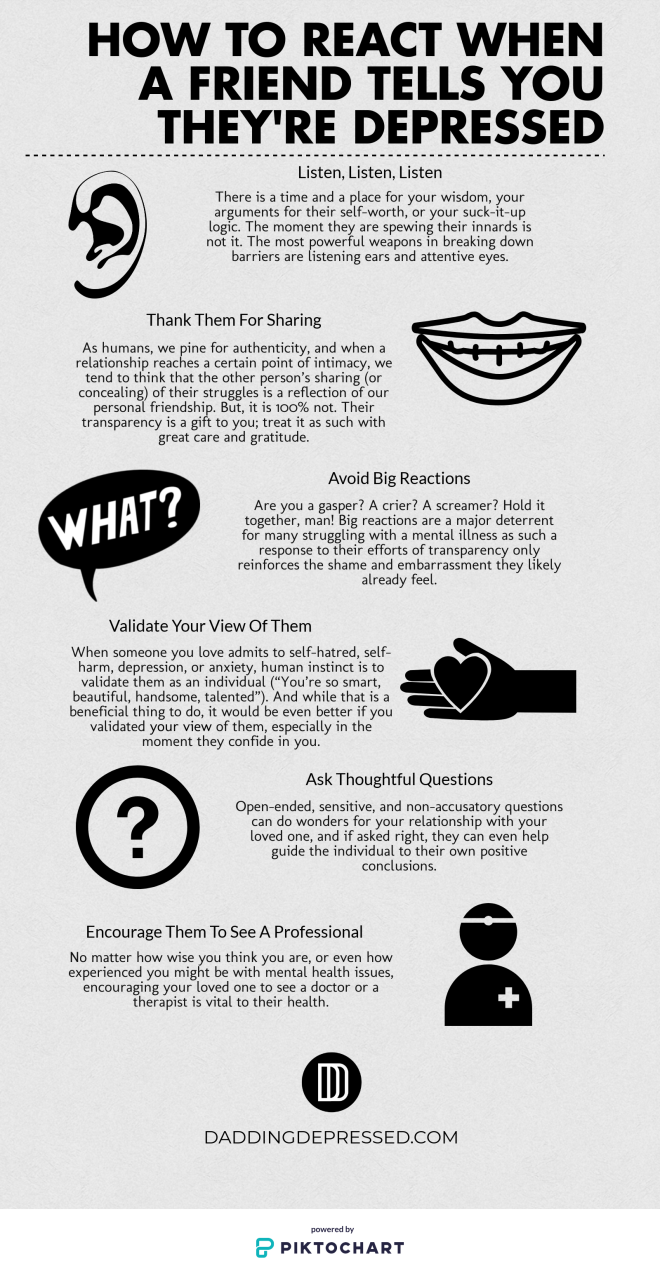
SEE ALSO: How To Love Someone With A Mental Illness
“We All Need That Person; For Me, It’s My Wife”

“Sawyer, stop looking at me like that.” Sawyer’s my dog. He doesn’t speak English. I wish he did. Then again, maybe he wouldn’t love me as unconditionally. His small brain makes him loyal and willing to stay in bed until noon with me.
I have those mornings sometimes. I wake up with the kids and put on an Academy Award-winning performance until they leave for school. As soon as my wife Lauren leaves to drive them though, all the adrenaline gets sapped out of me and I crawl back into bed. 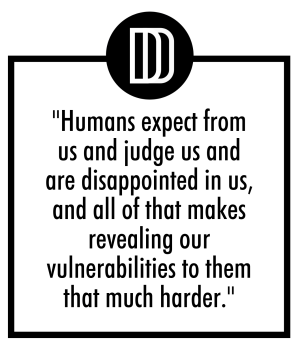
At some point, I then make eye contact with Sawyer and decide I’m disappointing him. But I’m not. No matter how poor a mood you’re in, irrespective of how you look, or smell (actually, they prefer if you smell bad), dogs are there for you.
It’s that other species that live in our houses and works with us and has the nerve to say hello while we’re minding our own business walking our dogs, that’s the problem. Humans expect from us and judge us and are disappointed in us, and all of that makes revealing our vulnerabilities to them that much harder.
I waited a long time to tell each person in my life that I struggle with anxiety and depression. There were practical reasons I kept it to myself – I didn’t want to burden others; I didn’t want it to affect me professionally; I haven’t picked up my cell phone since 2012 – but ultimately it came down to this: I was embarrassed by it. And the reason
for embarrassment was different for each person in my life.
My parents know I take Prozac. But the flow of information to them pretty much ends right there. I have determined that the stress it puts on them outweighs any benefit of support they can offer me. Not to mention the fear of disappointing them, the concern they view it as an indictment of their parenting, and probably most prominently, the reality that they just have archaic views on mental health.
As for friends, until about a month ago when I put my website up with the word “depression” in the header image, no one knew. To a degree, you never stop feeling like you’re in high school and want other people to like you.
Although, Lauren and her friends are slightly better about opening up to each other about their problems. They confide in each other about their issues, and how each of their husbands is dealing with some sort of neuroses or addiction. It’s actually kind of funny when we get together because clearly the wives go back and tell their husbands what they discussed with their friends. So everyone knows how screwed up everyone else is, yet no one ever brings it up when we’re together. Instead, when we go out to restaurants, we sneak our Xanax under the table and pop it into our mouths when we think no one is looking.
Since my site went up, people have come out from under trailers practically to tell me they’ve struggled too (I’m not sure why I used “trailers,” as no one within 50 miles of me has a trailer). Some are internet friends whom I’ve never met. Some are actual people in my life. It’s both relieving and sad to hear from others about their struggles. Of course, this momentary connection doesn’t mean they want me calling them next Thursday to tell them I’m having a bad day.
And then there’s Lauren. For years while we were dating, I withheld my depression from her. My default setting was to portray myself as masculine and strong, as that was what I thought an attractive male was. Lauren now knows everything (well, almost everything. I’ll get to that in a minute). I’d like to say it’s because of the progress we’ve made to break gender stereotypes. Or even that I’ve determined she’ll love me “in sickness and in health.” In reality, it’s because you really don’t have a choice when you sleep in the same bed as someone. There’s just nowhere to hide from them (Well, technically there is if you fall asleep on the couch every night with a spoon of peanut butter in your mouth).
Sure, there are small things I still keep from her. For example, she’ll be annoyed to find out in this very sentence that I’ve been lying to her about hating the taste of Craisins, when in fact I don’t eat them because of some weird OCD reason I won’t even get into here.
And I’m not getting rid of my therapist so fast. We all need someone without a dog in the fight who we can reveal our most crazy thoughts to, and frankly, who we can complain about our spouses to. My marriage is ripe with complications like any good marriage is.
But you still need that person who isn’t peeking at the clock while you spill your guts out, and is available on weekends, and isn’t four-legged. You need someone who you can take your manhood or womanhood and put it aside and crumble before them. Without that person, you’re going to explode at some point.
For me, that person is my wife. Thank God I’m so handsome.
 Author of the upcoming memoir, What Could Go Wrong – My Mostly Comedic Journey Through Marriage, Parenting, and Depression, Brett is an attorney and lives with his wife and two preschool children in Bergen County, New Jersey.
Author of the upcoming memoir, What Could Go Wrong – My Mostly Comedic Journey Through Marriage, Parenting, and Depression, Brett is an attorney and lives with his wife and two preschool children in Bergen County, New Jersey.
Visit Brett at brettgraysonbooks.com
Photo by Molly Belle on Unsplash
Children’s Book Review: The Book With No Pictures
DISCLOSURE: Some of the links below are affiliate links, meaning, at no additional cost to you, I will earn a commission if you click through and make a purchase.
 It may seem impossible to convince a child to ditch a picture book, but The Book With No Pictures makes a persuasive case for imageless entertainment, teaching kids that a book with no pictures can still be fun.
It may seem impossible to convince a child to ditch a picture book, but The Book With No Pictures makes a persuasive case for imageless entertainment, teaching kids that a book with no pictures can still be fun.
Two Christmases ago, my wife and I bought The Book With No Pictures for my nephew, Shane. I’d be lying if I said it wasn’t in part because I’m a fan of The Office. B.J. Novak, the guy who played the lovable (and distasteful) Ryan Howard, is the author of the instant classic.
Shane ripped the wrapping paper like only a four-year-old could, and, as he examined the book, I watched his eyes dim to a murky shade of disappointment. He set it aside, muttered a forced “Thank you,” and picked up the book about trains his brother got.
“I want a book with pictures.”
Later that morning, my brother-in-law offered to read it to him. With a shrug of his shoulders and a pair of iron feet, Shane situated himself on his dad’s lap. My brother-in-law began making absurd noises, saying things like “blork” and “my head is made of blueberry pizza.” Shane laughed, and, in the end, asked to read it again.
My sister (Shane’s mom) appreciates the book too but for different reasons. I asked her what she thought.
“I like how the book introduces the concept of words being associated with meaning,” she says. “It shows kids that reading is not just an adult describing pictures but rather saying the words they see and that those words are interesting and fun all on their own.”
I like how the inside cover describes it:
“At once disarmingly simple and ingeniously imaginative, The Book With No Pictures inspires laughter every time it is opened, creating a warm and joyous experience to share–and introducing young children to the powerful idea that the written word can be an unending source of mischief and delight.”
BUY IT HERE!
May The Force Be With THE BEST OF MAY 2018
I’m happy to announce Dadding Depressed continues to grow in its readership. May was my highest month yet in views! Here are the most read articles of the month:
One Family’s Resolve To Combat Suicide A Step At A Time
“Even when it doesn’t end in suicide, mental illness is a life-killer.”
The Horrific Day My Daughter Was Born
“’I’m going to check your cervix now,’ a nurse told Lindsey as my wife wailed and writhed on the hospital bed.
Without warning, the nurse whipped open the door and yelled into the hall.
‘She’s at ten centimeters!’
It was go-time.”
Is Your Husband Depressed? Look For These Signs
“Many men are depressed–most just don’t know it yet.”
You’re Not Perfect And You Don’t Have To Be
“Get this through your stubborn, stone skull: you are not perfect and you don’t have to be.”
Do You Have A Fixed Or A Growth Mindset?
“This life is not about proving ourselves. It’s about improving ourselves.”
Have something you want me to write about? Visit my Contact page!
This Is The Hardest Thing About Counseling For People Who Need It
Rob sat across from me at a sleek white table on the patio of Detroit’s New Order Coffee. The steam from each of our mugs twiddled with the dawn in the calm before the storm–the storm of emotions I knew would soon whirl out of control at the feet of a therapist named Justin.
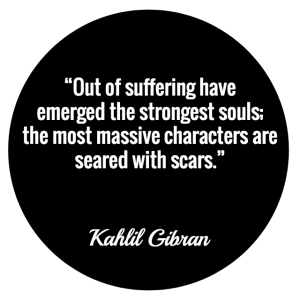
My friend pretended not to notice the familiar twitch tugging on the left side of my neck. Neither of us said a word about it, but it refused to be ignored as if the hands of my Fossil watch were reeling my head to prove the waning seconds.
Tick, tock, tick, tock, tick–
“I should go,” I said.
“Yeah. Let me know how it goes?” His eyes smiled. “It’s gonna be good,” he said.
I should have left sooner, but, to be honest, I was clinging to my friendship with Rob as a child holds a blanket. Once I got in the car, the GPS said I’d be five minutes late. Shit. Five minutes.
Five minutes worth of fresh material served on a silver platter (“So, Doug…you have issues with timeliness. Why don’t you tell me about that?”).
Five minutes in which the two of us could have maybe unraveled the solution to all of my depression and go ahead to cure the world of it while we’re at it.
Five minutes would if nothing else, enforce the hustle of shame, and the bumbling words, “S-sorry I was s-so late,” to dribble like vomit from my mouth.
Five minutes meant five lashings–not physical ones, of course–self-inflicted mental lashings with an iron whip made of self-deprecation and the fog of hatred from my mirror.
Five minutes was…in the end…not a big deal. At all. I shook Justin’s hand and followed him down the stairs and into his office.
It was a bare room, oversized for a therapist’s office but too small for a classroom–what it once was. Justin added decor to the tired space which seemed to represent the revitalization of Detroit. A pour-over coffee kit sat in the dunce corner. Charcoal gray sofa, slim with pointed wooden legs sat in the middle of the room and across from two complimentary chairs–all surrounded by chipping brick walls. Everything in the room, even the Devil’s Ivy dripping over the coffee table, seemed to echo the truth of Kahlil Gibran: “Out of suffering have emerged the strongest souls; the most massive characters are seared with scars.”
“So,” Justin said, “how’s it going?”
I don’t remember much of that first meeting with Justin. But, I do know that getting through the door is always the hardest part of going to counseling. If you can lean on the encouragement of friends and family, not be deterred by small hiccups, and simply get yourself through the door, a good professional will take it from there, and you’ll be glad you went.
I was.
So, where are you at in the process? Are you in the coffee shop where counseling is a mere conversation? Are you in the car where you’re ready but you don’t know where to go? Or maybe you’re at the door, and all you need to do is knock.
Wherever you’re at right now, let’s get you through that door.


